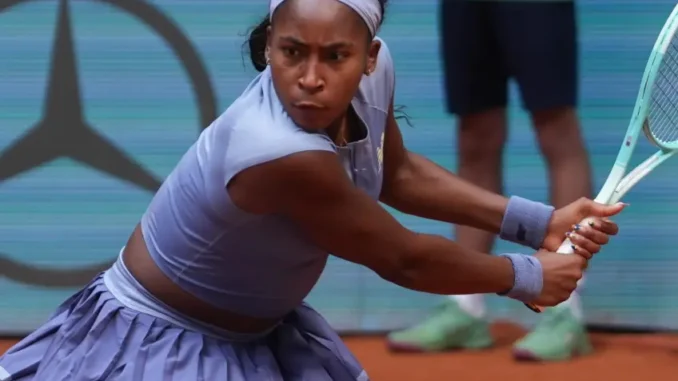
In the electric atmosphere of the Caja Magica, Coco Gauff stood on the cusp of her first title of 2025, facing world No. 1 Aryna Sabalenka in the Madrid Open final on May 3. The 21-year-old American, riding a wave of confidence after a stunning 6-1, 6-1 semifinal rout of Iga Swiatek, fell short in a 6-3, 7-6(3) defeat that left her grappling with regrets. Yet, Gauff’s candid reflection on her performance, marked by a faltering serve and missed opportunities, revealed a champion’s resolve to learn and grow. Her journey to the final, coupled with her rise to No. 3 in the WTA rankings, underscores a player poised to turn heartbreak into motivation as the clay season unfolds.
Gauff’s Madrid campaign was a rollercoaster of redemption. After a shocking 6-0 first-set loss to Dayana Yastremska in her opener, she rallied to win 0-6, 6-2, 7-5, showcasing the resilience that defined her run. Straight-set victories over Ann Li, Belinda Bencic, and Mirra Andreeva followed, culminating in her demolition of Swiatek, her third straight win over the Pole, flipping their head-to-head from 7-0 to 11-4. “I was aggressive and played with margin,” Gauff said of that match, crediting her ability to force Swiatek into “awkward positions.” The final, however, exposed vulnerabilities, particularly her serve, which had been a weapon all week. With a first-serve percentage of just 55% and eight double faults, including a critical one in the tiebreak, Gauff struggled against Sabalenka’s aggressive return game. “My first serve has been such a weapon this week, so just wish I could have served better,” she lamented, pinpointing her 42% second-serve point win rate as a key shortfall.
The match was a tale of missed chances. Gauff lost 17 consecutive points in the first set, allowing Sabalenka to surge to a 4-1 lead. In the second, she fought back, breaking serve to lead 5-3 and earning a set point at 5-4. But Sabalenka’s relentless pressure, coupled with Gauff’s three double faults in that game, forced a tiebreak where the Belarusian prevailed. “I had a set point in the second set and a couple of chances in the tiebreak to go up,” Gauff said, her voice tinged with frustration. “The first serve percentage was really low today, and when you’re playing someone as aggressive as Aryna, you have to put more first serves in the court.” Her four additional winners were overshadowed by seven more unforced errors than Sabalenka, a statistic that stung for a player known for her defensive prowess.
Despite the defeat, Gauff’s perspective remained forward-looking. “Overall there’s a lot of positives to take,” she said, celebrating her ascent past Jessica Pegula to become the top-ranked American woman. “I went from an 0-6 set in the first round and made it to the final, so happy with that.” The loss, her first in a WTA final since the 2022 French Open, was only her second in 11 career finals, a record that fuels her hunger. “I hate losing a lot, and especially in finals, because it’s like you’re so close,” she admitted. “Each time it’s a learning experience, and maybe I needed to feel this loss again to be motivated again, even more motivated for the next one.” Her upbeat social media post echoed this resolve: “Not the outcome I was hoping for today but a lot to be proud of. Leaving here with my head up and more motivation to work even harder to do better next time.”
Gauff’s Madrid run, which included navigating a power outage that forced her to walk back to her hotel, highlighted her adaptability. Her doubles campaign, where she was accidentally struck in the head by partner Robin Montgomery’s serve, added a lighthearted moment—she credited her braids for cushioning the blow. As she heads to the Italian Open, where she defeated Sabalenka on clay in 2021, Gauff carries lessons from Madrid’s high-altitude clay. With Roland Garros looming, where she reached the 2022 final, her ability to channel regrets into refinement positions her as a formidable contender, ready to seize the next opportunity.
Leave a Reply